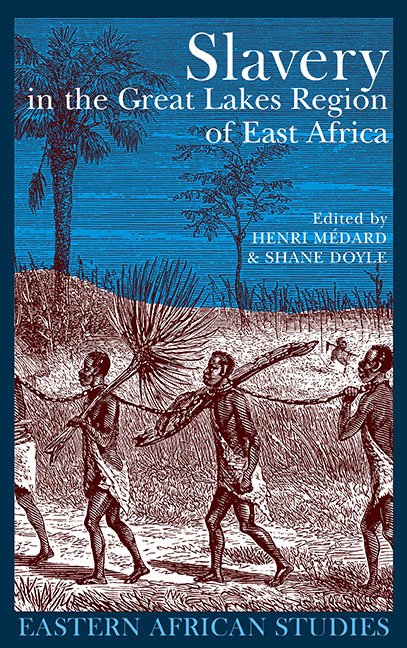Book contents
- Frontmatter
- Dedication
- Contents
- List of Maps & Tables
- Notes on Contributors
- Introduction
- 1 Violence, Marginality, Scorn & Honour: Language evidence of slavery to the eighteenth century
- 2 Notes on the Rise of Slavery & Social Change in Unyamwezi c. 1860 –1900
- 3 Slavery & Forced Labour in the Eastern Congo 1850 –1910
- 4 Legacies of Slavery in North West Uganda: The story of the ‘One-Elevens’
- 5 Human Booty in Buganda: Some observations on the seizure of people in war c.1700 –1890
- 6 Stolen People & Autonomous Chiefs in Nineteenth-Century Buganda: The social consequences of non-free followers
- 7 Women's Experiences of Enslavement & Slavery in Late Nineteenth- & Early Twentieth-Century Uganda
- 8 Slavery & Other Forms of Social Oppression in Ankole 1890 –1940
- 9 The Slave Trade in Burundi & Rwanda at the Beginning of German Colonisation 1890 –1906
- 10 Bunyoro & the Demography of Slavery Debate: Fertility, kinship & assimilation
- References
- Index
1 - Violence, Marginality, Scorn & Honour: Language evidence of slavery to the eighteenth century
Published online by Cambridge University Press: 11 August 2017
- Frontmatter
- Dedication
- Contents
- List of Maps & Tables
- Notes on Contributors
- Introduction
- 1 Violence, Marginality, Scorn & Honour: Language evidence of slavery to the eighteenth century
- 2 Notes on the Rise of Slavery & Social Change in Unyamwezi c. 1860 –1900
- 3 Slavery & Forced Labour in the Eastern Congo 1850 –1910
- 4 Legacies of Slavery in North West Uganda: The story of the ‘One-Elevens’
- 5 Human Booty in Buganda: Some observations on the seizure of people in war c.1700 –1890
- 6 Stolen People & Autonomous Chiefs in Nineteenth-Century Buganda: The social consequences of non-free followers
- 7 Women's Experiences of Enslavement & Slavery in Late Nineteenth- & Early Twentieth-Century Uganda
- 8 Slavery & Other Forms of Social Oppression in Ankole 1890 –1940
- 9 The Slave Trade in Burundi & Rwanda at the Beginning of German Colonisation 1890 –1906
- 10 Bunyoro & the Demography of Slavery Debate: Fertility, kinship & assimilation
- References
- Index
Summary
Introduction
How did words for slaves, captives, dependants, and enslavement used by Bantu-speaking communities in the Great Lakes region of East Africa change and endure in the centuries before 1800? Which of the earlier kinds of violence and ideologies of hierarchy underpinned enslavement and commercial slavery in the nineteenth century? This essay will explore these questions by focusing on two types of language evidence: new words with relatively new meanings for forms of slavery, and new meanings related to slavery that Great Lakes Bantu-speakers attached to words whose earlier meanings had no clear connection to the commercialised forms of marginality that were so prominent in the nineteenth century (see Appendix). The shifts in meanings revealed in the analysis of these words’ semantic variability open up ideas about honour, scorn and hierarchy that distinguish the elite from the common people, the insider from the outsider, and shed light on notions of authority and legal practices that enforced those divides. The shifts in meaning also touch on theories of gender and generation that assigned significant weight to types of work as defining features of individuals and appropriately distinct capacities of different generations. Approaching a history of slaveries in Africa in this manner sidesteps stubborn, recent and highly politicised dichotomies between malignant and benign, open and closed, forms of slavery because it analyses the inventions and extensions of meaning in specific historical contexts. The antiquity of thinking about forms of social marginalisation and experiences of violence must first be assessed as significant historical conclusions in their own right, before exploring how they might have shaped more recent meanings of slavery and enslavement.
The slaveries mentioned in the nineteenth- and twentieth-century documentary records have very different historical depths, with the great majority reaching no further than the eighteenth century. They emphasised degrees of immobility and social marginalisation in a commercial context. The common concern with fixing slaves inside or outside a particular social nexus, an exclusionist impulse in Great Lakes and coastal East African cultural habits, is much older than the eighteenth century and is linked to broader historical processes than a study of terms for slavery alone can reveal.
- Type
- Chapter
- Information
- Slavery in the Great Lakes Region of East Africa , pp. 38 - 75Publisher: Boydell & BrewerPrint publication year: 2007



